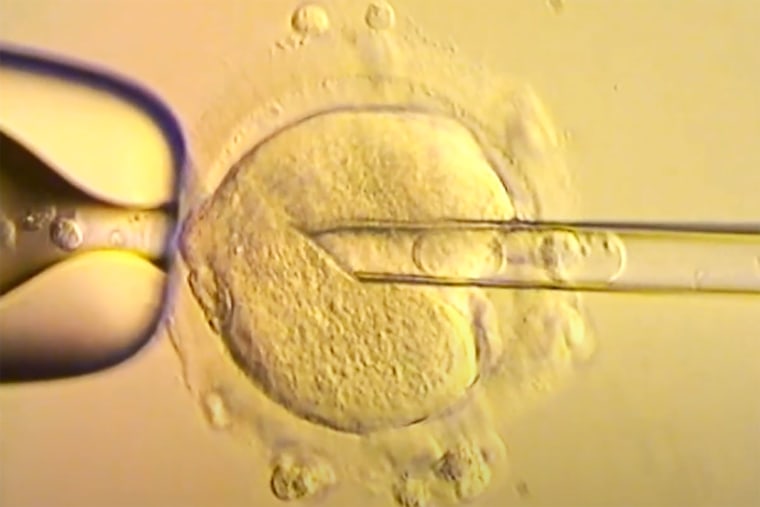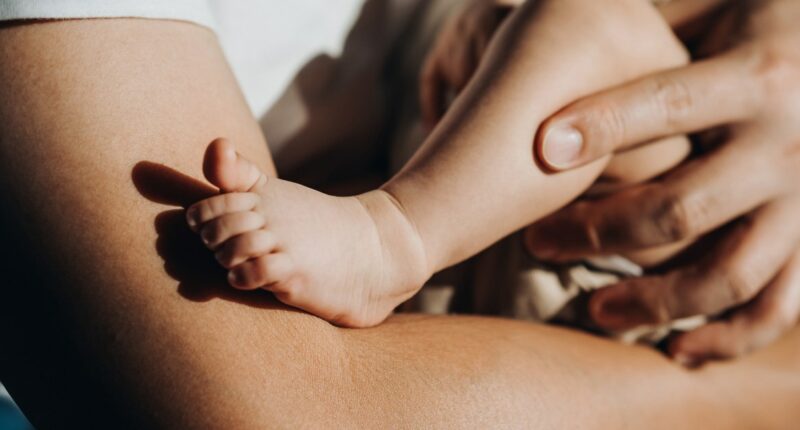Share this @internewscast.com
In London, researchers revealed that eight healthy babies have been born in the UK through an innovative technique designed to prevent the transmission of severe hereditary diseases from mothers to their offspring. This method involves using DNA from three individuals.
Most of our DNA resides in the cell’s nucleus, comprising genetic information inherited from both parents, which determines our identity. However, cells also contain DNA in the mitochondria, located outside the nucleus. Mutations in this mitochondrial DNA can result in serious conditions for children, manifesting as muscle weakness, seizures, delayed development, critical organ failures, and even death.
Testing during the in vitro fertilization process can usually identify whether these mutations are present. But in rare cases, it’s not clear.
Scientists have created a procedure to combat this issue by incorporating healthy mitochondria from a donor egg. By 2023, they had reported the birth of the first babies using this approach. The process involves extracting genetic material from the mother’s egg or embryo and inserting it into a donor egg or embryo, which retains healthy mitochondria but has had most of its original DNA removed.
The latest research “marks an important milestone,” said Dr. Zev Williams, who directs the Columbia University Fertility Center and was not involved in the work. “Expanding the range of reproductive options … will empower more couples to pursue safe and healthy pregnancies.”
Using this method means the embryo has DNA from three people — from the mother’s egg, the father’s sperm and the donor’s mitochondria — and it required a 2016 U.K. law change to approve it. It is also allowed in Australia but not in many other countries, including the U.S.
Experts at Britain’s Newcastle University and Monash University in Australia reported in the New England Journal of Medicine Wednesday that they performed the new technique in fertilized embryos from 22 patients, which resulted in eight babies that appear to be free of mitochondrial diseases. One woman is still pregnant.

One of the eight babies born had slightly higher than expected levels of abnormal mitochondria, said Robin Lovell-Badge, a stem cell and developmental genetics scientist at the Francis Crick Institute who was not involved in the research. He said it was still not considered a high enough level to cause disease, but should be monitored as the baby develops.
Andy Greenfield, a reproductive health expert at the University of Oxford who was not involved in the study, called it “highly significant,” adding that the method of exchanging mitochondria would only be used for a small number of women for whom other ways of avoiding passing on genetic diseases, like testing embryos at an early stage, was not effective.
“The technique was first made lawful 10 years ago, so we have all been waiting for this report,” he told NBC News over email. “Fortunately, the children appear to be healthy.”
Follow-up of these children — potentially for many years — would be important to ensure they remain healthy, he said.
Lovell-Badge said the amount of DNA from the donor is insignificant, noting that any resulting child would have no traits from the woman who donated the healthy mitochondria. The genetic material from the donated egg makes up less than 1% of the baby born by using this technique.
“If you had a bone marrow transplant from a donor … you will have much more DNA from another person,” he said.
In the U.K., every couple seeking a baby born through donated mitochondria must be approved by the country’s fertility regulator.
Critics have previously raised concerns, warning that it’s impossible to know the impact these sorts of novel techniques might have on future generations.
“Currently, pronuclear transfer is not permitted for clinical use in the U.S., largely due to regulatory restrictions on techniques that result in heritable changes to the embryo,” Williams, of Columbia, said in an email. ”Whether that will change remains uncertain and will depend on evolving scientific, ethical, and policy discussions.”
For about a decade, Congress has included provisions in annual funding bills banning the Food and Drug ministration from accepting applications for clinical research involving techniques, “in which a human embryo is intentionally created or modified to include a heritable genetic modification.”
But in countries where the technique is allowed, advocates say it could provide a promising alternative for some families.
Liz Curtis, whose daughter Lily died of a mitochondrial disease in 2006, now works with other families affected by them. She said it was devastating to be told there was no treatment for her eight-month-old baby and that death was inevitable.
She said the diagnosis “turned our world upside down, and yet nobody could tell us very much about it, what it was or how it was going to affect Lily.” Curtis later founded the Lily Foundation in her daughter’s name to raise awareness and support research into the disease, including the latest work done at Newcastle University.
“It’s super exciting for families that don’t have much hope in their lives,” Curtis said.
The Human Fertilisation and Embryology Authority, the UK’s fertility regulator, welcomed the findings, adding that the technique would legally only be available to those at very high risk of passing the disease onto their children.
As of this month, 35 patients have been authorized to undergo the procedure.











